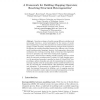117
Voted
ISTA
2008
15 years 3 months ago
2008
Seamless exchange of models among different modeling tools increasingly becomes a crucial prerequisite for the success of modeldriven engineering. Current best practices use model ...
113
click to vote
BIRTHDAY
2008
Springer
15 years 4 months ago
2008
Springer
In this paper a sequence of model transformation languages L0, L1, L2 is defined. The first language L0 is very simple, and for this language it is easy to build an efficient compi...
145
click to vote
PAAMS
2009
Springer
15 years 6 months ago
2009
Springer
Abstract Many Multi-Agent Systems (MAS) methodologies incorporate a modeldriven approach. Model Driven Engineering is based on three main ideas: models are the “first-class citi...
112
click to vote
SAC
2006
ACM
15 years 8 months ago
2006
ACM
This paper studies ways for modularizing transformation definitions in current rule-based model transformation languages. Two scenarios are shown in which the modular units are id...
122
click to vote
SAC
2006
ACM
15 years 8 months ago
2006
ACM
Transforming models is a critical activity in Model Driven Engineering (MDE). With the expected adoption of the OMG QVT standard for model transformation language it is anticipate...
102
click to vote
OOPSLA
2009
Springer
15 years 8 months ago
2009
Springer
Model transformations provide a powerful capability to automate model refinements. However, the use of model transformation languages may present challenges to those who are unfami...
167
click to vote
OOPSLA
2009
Springer
15 years 8 months ago
2009
Springer
Model evolution is often supported by writing model transformation rules in specialized languages. This presents challenges to those who are unfamiliar with model transformation l...

